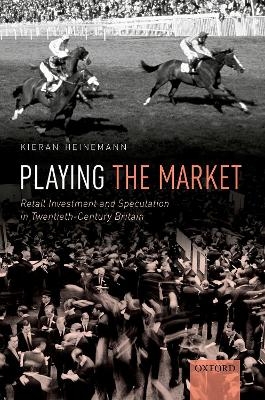
Playing the Market
Retail Investment and Speculation in Twentieth-Century Britain
Seiten
2021
Oxford University Press (Verlag)
978-0-19-886425-7 (ISBN)
Oxford University Press (Verlag)
978-0-19-886425-7 (ISBN)
This book explores the distinctively British obsession with investment and speculation. It explains how and why everyday British people increasingly invested, speculated, and gambled in stocks and shares from the outbreak of World War I, over the postwar decades and the Thatcher years, up until the premiership of Tony Blair.
Nowhere in Europe are people more likely to enjoy a regular flutter in stocks and shares than in Britain. Whether we consider the millions of online stockbroking accounts or the billions spent on spread betting - it is a national pastime in today's Britain to play the markets. How did this distinctively British obsession with investment and speculation come about? Playing the Market tells this story by exploring the history of financial capitalism in Britain during the twentieth century from below. It explains how and why everyday British people increasingly invested, speculated, and gambled in stocks and shares from the outbreak of World War I, over the postwar decades and the Thatcher years, up until the premiership of Tony Blair.
The study accounts for a momentous shift in attitudes towards stock market investment that occurred throughout the twentieth century. In the interwar period, traditional moral and cultural constraints about the stock market, which were still powerful in the Victorian period, gradually began to collapse in public and private life. In the following decades, financial securities lost their stigma of being either immoral or suitable only for the upper classes. Promising higher than average returns and a similar thrill of risk and reward as gambling in horses or the football pools, the stock market became a popular pastime for millions of Britons - even in the postwar decades, when Britain had nationalized industries and politicians of both parties indulged in staunchly anti-finance rhetoric. With the expansion of popular investment after both world wars, Britain developed a stock market culture that was unique across Europe and gave rise to a market populist sentiment that eventually proved fertile soil for the arrival of Thatcherism.
Nowhere in Europe are people more likely to enjoy a regular flutter in stocks and shares than in Britain. Whether we consider the millions of online stockbroking accounts or the billions spent on spread betting - it is a national pastime in today's Britain to play the markets. How did this distinctively British obsession with investment and speculation come about? Playing the Market tells this story by exploring the history of financial capitalism in Britain during the twentieth century from below. It explains how and why everyday British people increasingly invested, speculated, and gambled in stocks and shares from the outbreak of World War I, over the postwar decades and the Thatcher years, up until the premiership of Tony Blair.
The study accounts for a momentous shift in attitudes towards stock market investment that occurred throughout the twentieth century. In the interwar period, traditional moral and cultural constraints about the stock market, which were still powerful in the Victorian period, gradually began to collapse in public and private life. In the following decades, financial securities lost their stigma of being either immoral or suitable only for the upper classes. Promising higher than average returns and a similar thrill of risk and reward as gambling in horses or the football pools, the stock market became a popular pastime for millions of Britons - even in the postwar decades, when Britain had nationalized industries and politicians of both parties indulged in staunchly anti-finance rhetoric. With the expansion of popular investment after both world wars, Britain developed a stock market culture that was unique across Europe and gave rise to a market populist sentiment that eventually proved fertile soil for the arrival of Thatcherism.
Kieran Heinemann read History in Berlin and Cambridge, where he obtained his PhD in 2017. He now lives and works in Stockholm. His articles have been published in Twentieth Century British History, Vierteljahrshefte für Zeitgeschichte, and Archiv für Sozialgeschichte.
Introduction
1: Bucket Shops and Outside Brokers
2: The Stock Market Game in Postwar Britain
3: The Financial Press and the Investing Public
4: The Politics of Wider Share Ownership
5: The Profit Motive: Inflation and Private Investment in the 1970s
6: Popular Capitalism?
Bibliography
| Erscheinungsdatum | 25.08.2021 |
|---|---|
| Verlagsort | Oxford |
| Sprache | englisch |
| Maße | 163 x 240 mm |
| Gewicht | 588 g |
| Themenwelt | Geschichte ► Teilgebiete der Geschichte ► Wirtschaftsgeschichte |
| Wirtschaft ► Betriebswirtschaft / Management ► Finanzierung | |
| ISBN-10 | 0-19-886425-6 / 0198864256 |
| ISBN-13 | 978-0-19-886425-7 / 9780198864257 |
| Zustand | Neuware |
| Haben Sie eine Frage zum Produkt? |
Mehr entdecken
aus dem Bereich
aus dem Bereich


